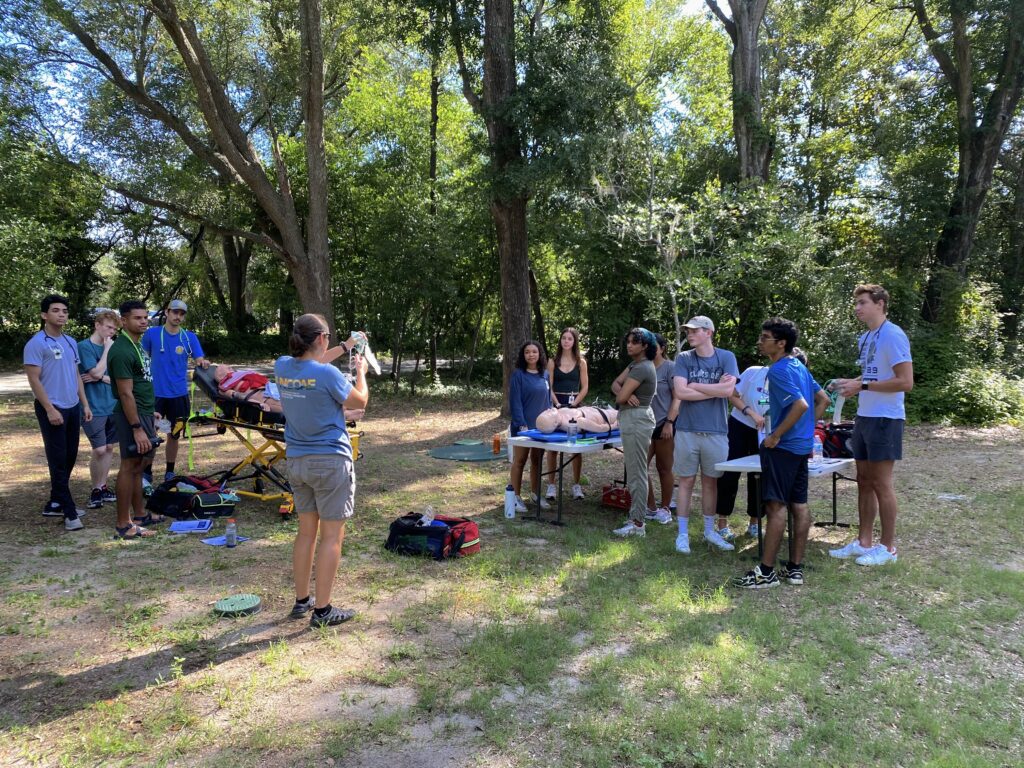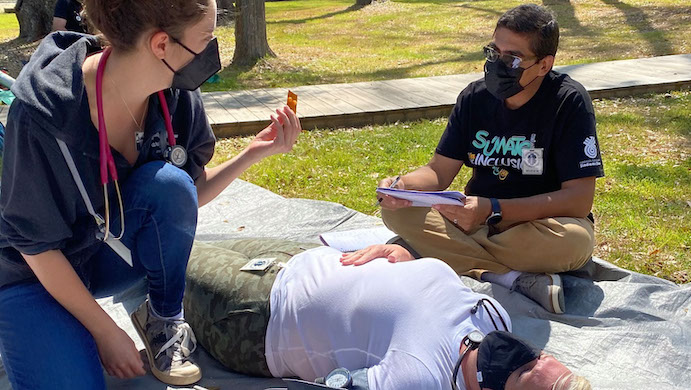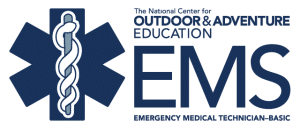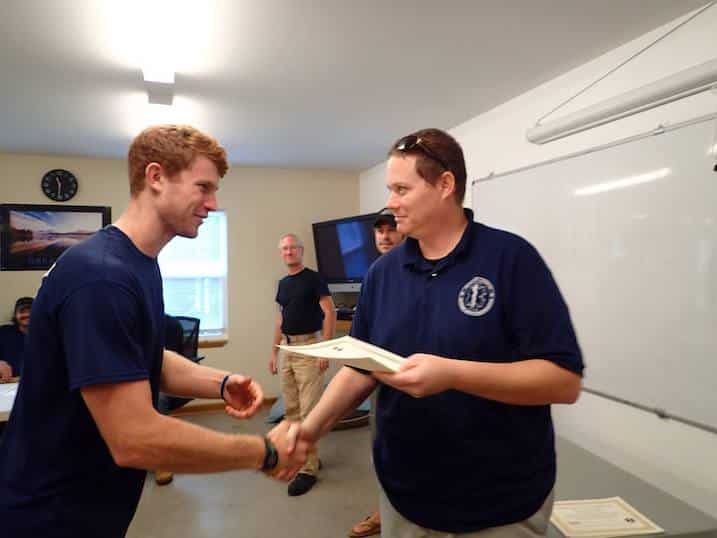Most EMS Terminology Comes Down to Initials, Abbreviations and Acronyms
EMT TrainingA few years ago, we ran a three-part series on slogans, slang, and terminology as it applies to a trio of human-powered outdoor recreational activities. If you recall, we started out with some “gnarly” surfing terms, then we “tied in” to a conversation about climbing, finally pulling a “wet exit” on the language of paddling.
You can review these three articles using the links below:
- From Sept. 20, 2020: Surfing Terminology and Slang: You Can’t Play BINGO Without the Lingo
- From Oct. 10, 2020: On Belay — Climbing Terminology and Slang
- From Oct. 30, 2020: Paddling Terminology and Slang: Nobody Says ‘Up a River Without an Oar’
There was quite a bit of word whimsy in those articles, and we made sure to remind readers that successfully lassoing the linguistics of a particular activity was no guarantee you were mastering that particular sport professionally.

Today we’re taking a more serious look at language, this time highlighting the terminology used by members of the Emergency Medical Service (EMS) community. That’s because one of our areas of focus here at The National Center for Outdoor & Adventure Education (NCOAE) is emergency medicine training and education. And whether you’re an EMS, medical professional, or wilderness first responder (WFR), these terms are most often employed when these professionals find themselves managing a medical emergency.
First off, you might notice that most of these terms come in the form of acronyms, abbreviations, and initials, and the reason for that is to enable first responders to quickly communicate and react with each other and the patient in the field.
The source for these acronyms comes from the NCOAE Wilderness Medicine Field Guide (ISBN 978-0-578-87449-4).
Here, we present them in alphabetical order: (more…)
NCOAE’s EMT Training Opens the Doors to Jobs Across the U.S.
EMT TrainingApplicants to our nationally renowned EMT training courses often ask us if they can take
their new EMT credentials to the state where they live, and the answer is mostly yes.
The National Center for Outdoor and Adventure Education’s (NCOAE) campus is
located in North Carolina, where we offer 21-day “Intensive” EMT-Basic and 23-day
“Intensive” Advanced EMT training courses among others. Successful completion of
these courses authorize our graduates to take the National Registry of Emergency
Medical Technicians (NREMT) exam.

National Registry Certification examinations evaluate the competence of EMS
practitioners at a variety of levels, including Emergency Medical Responder (EMR),
Emergency Medical Technician (EMT), Advanced Emergency Medical Technician
(AEMT), and Paramedic.
NREMT credentials are either required for an initial license or accepted for legal
recognition or reciprocity in all 50 states and Puerto Rico. That makes it easier to
maintain
21-Day Intensive EMT-Basic Training Now Available in North Carolina
EMT TrainingStarting and completing EMT-Basic training in North Carolina doesn’t have to be a long, drawn-out exercise. It’s now possible — in just 21 days — to obtain the proper training and knowledge to take and then pass the National Registry and the North Carolina state EMT exam.
Editor’s Note: This course was previously a 19-day training but has since transitioned into a 21-day ‘intensive’ EMT certification course with a unique hybrid component as of 2021. Keep reading, and then visit the link at the end of this post for the latest info.
The following EMT Training video, which explains the ‘Intensive’ EMT-Basic Training program offered here at NCOAE, explains how we do it and why it’s so effective at helping people obtain their EMT credentials:
Classes meet virtually for 11 consecutive days, which include 131 hours of didactic, classroom training. Then, the class meets in person for 10 days, for an additional 61 hours of hands-on training, as well as 48 hours of clinical and (more…)
Meet the Student: Gordon Harrison III
Student ProfilesIf Gordon Harrison’s name sounds familiar to you, that likely means one of two things: You either know him personally or you’re a fan of the water sport known as wakeboarding.
David “Gordon” Harrison (the third) recently graduated from one of our 19-Day ‘Intensive’ EMT-Basic training courses. And as you probably figured out by now, this native of Caroline County, Va. (who now calls Melbourne Beach, Fla. his home), holds the distinction of being the only professional athlete to enroll in that course — or any course for that matter here at The National Center for Outdoor & Adventure Education.
Harrison started wakeboarding as a child and become good enough in high school to be invited by the World Wake Association to join the Jr. Pro Wakeboard Tour. Suffice to say, he’s never looked backward since.
For the uninitiated, wakeboarding is a water-based sport in which the athlete — standing on a short board with foot bindings known as a wakeboard— is towed behind a motorboat across its wake, allowing the athlete to crest the wake for aerial maneuvers. In Harrison’s case, he’s so proficient at wakeboarding that he’s only one of a handful of people on the planet capable of making a living as a professional wakeboarder.
So, what possesses someone living the life of a pro athlete to drop everything and spend 19 days with us in North Carolina preparing to sit to for the NREMT (National Registry of Emergency Medical Technicians) exam? That’s what we wanted to know. Here’s what Harrison had to say, in his own words: (more…)
Jump Start Your Outdoor Education or Emergency Medicine Career with EMT Training
EMT TrainingFor those of us who work in the fields of outdoor and adventure-based experiential education and/or emergency medicine, the importance of professional medical training cannot be dismissed as merely “class time.”
While it’s true EMT training and certification may not be a requirement for many backcountry jobs or outdoor education positions, possessing certification for EMT qualifications far outweighs the Wilderness First Responder (WFR) certification, especially when it comes to landing your first or next job within this specialized field of ours.
Our certified EMS instructors are among the best in the industry and include veteran wilderness guides, EMT paramedics, firefighters, military operations specialists, and experts in critical care management. These educators provide expert instruction and personalized training that can ensure your EMT training meets and exceeds the high expectations all employers have for someone carrying such a designation.
Why You Should Consider the EMT Option
With EMT credentials in hand, our graduates have (more…)
Cheers to You and Us!
About NCOAEAs 2016 comes to an end, we’re honored to take a moment out from our end-of-year activities to say thank everyone for their continued support and encouragement of The National Center for Outdoor & Adventure Education (NCOAE).
When our founders Zac & Celine Adair started this organization in 2009, their mission then for NCOAE was as clear as it is today — improve people’s self-confidence and interpersonal relationships through the teaching of a core curriculum emphasizing teamwork, environmental stewardship and the acquisition of technical outdoor skills. We’ve come a long way since 2009, and guided by that same mission, 2016 has been another year of phenomenal growth.
A few key highlights: (more…)
NCOAE Receives Approval for EMT-Basic Training
Training & CertificationsWe’re pleased to announce that The National Center for Outdoor & Adventure Education (NCOAE) has received approval from the State of North Carolina and the North Carolina Office of Emergency Medical Services to offer an intensive 19-day EMT-Basic training.
 And what that means to anyone interested in securing their EMT-Basic credentials is that within three weeks of starting our intensive training, you’ll have the knowledge and experience to successfully pass the National Registry exam as well as North Carolina’s state exam, earning your EMT credentials.
And what that means to anyone interested in securing their EMT-Basic credentials is that within three weeks of starting our intensive training, you’ll have the knowledge and experience to successfully pass the National Registry exam as well as North Carolina’s state exam, earning your EMT credentials.
After that, you’ll have the option of staying with us for an additional five days for a practical session and certification of the Wilderness Upgrade. This certifies you as an EMT-B and WEMT from the Wilderness Medicine Training Center.
With your EMT credentials in hand, you’ll have an opportunity to enter a field that the Bureau of Labor Statistics claims is a “growing occupation.” Most certified emergency medical technicians (EMTs) find immediate employment at hospitals and ambulance companies, and many work for police or fire departments, receiving the same benefits as firemen and policemen — including pensions.
The median salary for an EMT is $27,070 per year, with entry-level employees averaging $17,300 and the top 10 percent earning $45,280.
There are three levels of EMT training:
- Basic EMT
- EMT-Advanced
- EMT-Paramedic
Students working toward the Basic EMT (a.k.a. EMT-B) credential here at NCOAE study patient assessment, the principals of pharmacology, BLS resuscitation, and participate in (more…)
TALK TO US
Have any further questions about our courses, what you’ll learn, or what else to expect? Contact us, we’re here to help!


